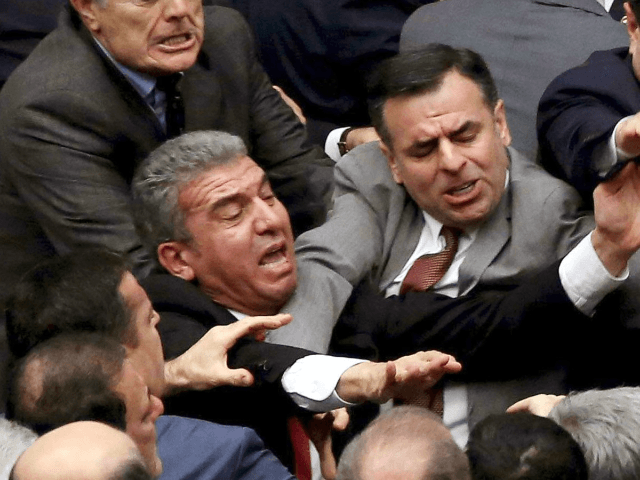A fistfight erupted on the floor of the Turkish parliament on Tuesday following the passage of a controversial election law, which critics denounced as a means for the ruling party to rig elections and make effective political opposition all but impossible.
Reuters summarizes the legislation:
The passage of the law grants Turkey’s High Electoral Board the authority to merge electoral districts and move ballot boxes to other districts.
Ballots that aren’t stamped by the local electoral board will still be admissible—formally approving a practice that caused a widespread outcry from government critics and concern from election monitors at a referendum last year.
Security force members will be allowed into polling stations when invited by a voter, a measure the government says is designed to prevent intimidation by the outlawed Kurdistan Workers Party (PKK) in the mainly Kurdish southeast.
The opposition, on the other hand, says the new measures will make vote counting less transparent and invite ballot-box stuffing. They also fear the government will start moving ballot boxes around to dilute the strength of opposition parties, a variation of complaints about congressional redistricting in the United States.
Finally, the new legislation would allow President Recep Tayyip Erdogan’s AKP (Justice and Development) party and its allies, such as the even more ardently nationalist MHP (Nationalist Movement Party), to create invulnerable electoral alliances and freeze opposition politicians out of power permanently.
Until now, Turkish law required minority parties to win a certain percentage of the national vote before they could hold seats in parliament. The new rules make it possible for Erdogan’s massive AKP to bring smaller allied parties like the MHP into parliament. The change is so significant that Daily Sabah simply refers to the bill as the “election alliance bill.”
These changes arrive just in time for next year’s presidential and parliamentary elections—the first presidential election since Erdogan survived a coup attempt and dramatically increased the powers of the Turkish presidency.
“The next presidential election will mark Turkey’s transition from a parliamentary system to one in which political power is concentrated in the presidency with almost no checks and balances,” said Wolfango Piccoli of Teneo Intelligence, in an analysis quoted by Bloomberg Politics.
“This is made to legitimize corruption,” opposition HDP (Peoples’ Democratic) party representative Meral Danis Bestas said of the new electoral law. Bestas was specifically referring to counting unstamped ballot papers, a practice critics say was employed to rig the 2017 referendum on expanding Erdogan’s powers. Turkish politicians note that parliamentary elections are often close, with many candidates splitting the vote, so it would not take much effort for the ruling party to manufacture the ballots it needs to win squeaker elections.
Debate over the bill ran for 20 hours, during which some heated words were exchanged and a fistfight broke out. The melee spilled out of the legislative chamber and into the parliament lobby:
“The battle in parliament is over but we will fight for election security by every means. We will go to the constitutional court regarding the unconstitutional nature of this regulation,” vowed deputy Ozgur Ozel of the main opposition CHP (Republican People’s) party after the vote was tallied.

COMMENTS
Please let us know if you're having issues with commenting.